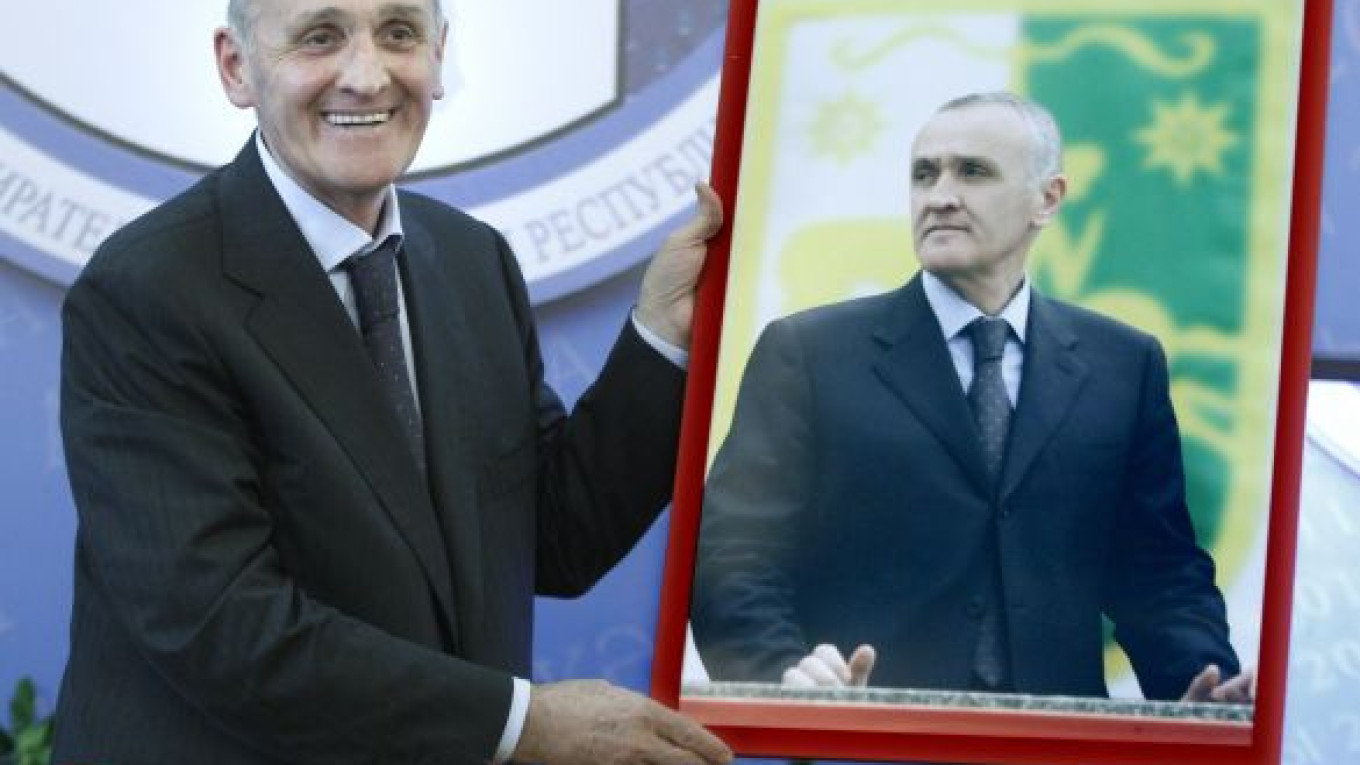With President Dmitry Medvedev's congratulations ringing in his ears, Abkhazia's newly elected president, Alexander Ankvab, has promised to pursue closer relations with Russia.
Ankvab, who as vice president led the breakaway Georgian region after President Sergei Bagapsh's death in May, was elected with 54.9 percent of the vote, according to election results released Saturday.
He easily defeated Prime Minister Sergei Shamba (21.02 percent) and former KGB agent Raul Khadzhimba (19.82 percent), the most vociferous critic of Abkhazia's growing dependence on Russia in Friday's election, the Central Election Commission said, Interfax reported.
Turnout reached an unprecedented 72 percent, or 106,000 of the region's 143,735 registered voters, it said.
"Russia is our strategic ally," Ankvab, 58, told reporters after his victory was announced. "We treasure these relations and intend to further develop them."
With no reliable opinion polls in Abkhazia, no clear candidate led the race going into the election.
A former Soviet apparatchik and Moscow businessman, Ankvab has survived four assassination attempts, most recently in September 2010 when unknown assailants fired a rocket-propelled grenade at his house.
Medvedev quickly congratulated Ankvab on the win, while Moscow's Foreign Ministry said the elections were a "success."
Georgia called the election illegitimate. Abkhazia threw off Georgian rule in wars in the early 1990s after the collapse of the Soviet Union.
The West officially ignored the election, but continues to monitor Abkhazia closely because of its potential to create friction between Georgia and Russia in the South Caucasus, a transit route for oil and gas from the Caspian Sea.
NATO said Saturday that it did not recognize the elections and reiterated its support for the sovereignty of Georgia.
"The holding of such elections does not contribute to a peaceful and lasting settlement of the situation in Georgia," Secretary-General Anders Fogh Rasmussen said in a statement.
The Organization for Security and Cooperation in Europe said via its chairman-in-office, Lithuania Foreign Minister Audronius Azubalis, that only a negotiated settlement of the conflict could provide legitimacy to any elections in Abkhazia.
In an e-mailed statement, he said "stakeholders" involved had to do more to achieve the solution, also hinting at Russia.
"Ultimately … the stakeholders must demonstrate the political will to achieve results in addressing regional security," Azubalis added.
Moscow recognized the statehood of Abkhazia and another Georgian rebel territory, South Ossetia, after a brief war in August 2008, when Russian forces thwarted Tbilisi's military attack on South Ossetia and pushed deep into Georgia.
Venezuela, Nicaragua and the tiny Pacific island of Nauru followed suit in recognizing Abkhazia, but the rest of the world considers both territories part Georgia.
Ankvab and his vice president, Mikhail Logua, visited Bagapsh's grave Saturday and met with the former president's widow, Marina Shonia, and children, Interfax reported. Bagapsh, 62, died of heart failure after suffering complications connected to a lung cancer operation in Moscow.
His widow thanked Ankvab for paying tribute to her husband with a "modest" election campaign and wished him and his team success.
(MT, Reuters)
A Message from The Moscow Times:
Dear readers,
We are facing unprecedented challenges. Russia's Prosecutor General's Office has designated The Moscow Times as an "undesirable" organization, criminalizing our work and putting our staff at risk of prosecution. This follows our earlier unjust labeling as a "foreign agent."
These actions are direct attempts to silence independent journalism in Russia. The authorities claim our work "discredits the decisions of the Russian leadership." We see things differently: we strive to provide accurate, unbiased reporting on Russia.
We, the journalists of The Moscow Times, refuse to be silenced. But to continue our work, we need your help.
Your support, no matter how small, makes a world of difference. If you can, please support us monthly starting from just $2. It's quick to set up, and every contribution makes a significant impact.
By supporting The Moscow Times, you're defending open, independent journalism in the face of repression. Thank you for standing with us.
Remind me later.


